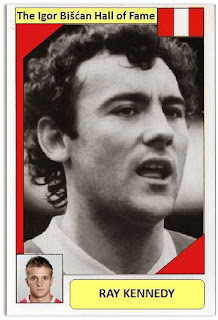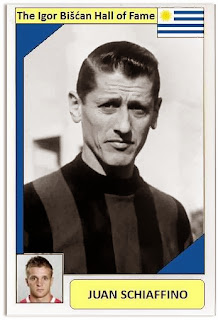Welcome to
my weekly blog “The Igor Bišćan Hall of Fame” every week I’ll be adding two new
additions, one will be a Liverpool Legend or fans favourite, the other a
Player, Manager or Club who have contributed to the world game we all love
(Gary Neville need not worry). Please comment below who you’d like to see make
the IBHoF, here are this weeks entries. YNWA
RAY KENNEDY
1974/75 -
1981/82
Ray Kennedy
was a rare bird, a deceptively talented individual whose inimitable
contribution to one of Liverpool's most imperious sides made nonsense of any
attempt to pigeon-hole him. Glib descriptions of a powerful midfielder – which
he became at Anfield after years as a successful striker with Arsenal – failed
dismally to do justice to his full, subtle range of distinctive abilities.
When Bill
Shankly signed Ray for £180,000 in the summer of 1974 - his last act as the
Reds' boss - he was rescuing a slightly overweight centre-forward, still eight
days short of his 23rd birthday, who had seemingly lost his way after playing a
crucial part in the Gunners' League and FA Cup double of 1970/71. The newcomer
found himself in at the dawn of the Paisley era and, despite an irritating
injury which kept him out of the season's first four League games, impressed
Bob enough to oust John Toshack from his front-running role. There followed a
sequence of 24 games in which Ray managed ten goals, but then he lost his place
as the Welshman was recalled in a bid to find a winning blend.
The turning
point, however, was not far away. Towards the end of the campaign Paisley began
experimenting with the former Highbury man in a deep-lying position behind the
Keegan-Toshack spearhead - and liked what he saw. By November 1975 Ray was
installed on the left of midfield where he was to help Liverpool lift ten major
honours in six years of almost uninterrupted triumph.
His value
to the team was incalculable, his footballing qualities legion, and if he
didn't quite catch the eye like a Souness or a McDermott, Ray had much to offer
the connoisseur. Still not the most athletic of figures - though more
streamlined than on his arrival - he had a delicate touch for such a big man;
he was adept at shielding the ball, a legacy of his days as a striker, and his
distribution was intelligent, swift and decisive. Like all top players who are
short of pace, Ray read the game well and often changed the emphasis of an
attack with a sweeping crossfield pass, but perhaps his deadliest attribute was
a knack of lurking unobtrusively on the left flank before making a late run
into the box to finish off a move at the far post.
In
important matches, he habitually spent the early minutes lying deeper than usual,
doing a containing job before allowing his attacking flair to blossom as the
game wore on, and opponents fell victim to a false sense of security. This
tendency was especially marked in European encounters, in which the England
international contributed some of his most vital strikes. An 83rd-minute away
goal to upset Bayern Munich in the 1981 European Cup semi-final and a fierce
second-half volley to turn the tide against Bruges when the Belgians were two
up in the 1976 UEFA Cup Final are just a couple that remain sharp in the
memory.
Ultimately
squeezed out of the side by the youthful challenge of Ronnie Whelan in December
1982, Ray joined John Toshack's colony of former Reds at Swansea for only
£20,000 less than his purchase price. A brief stint at Hartlepool preceded a
spell as a publican and a coaching appointment at Sunderland before it was
revealed that he had Parkinson's disease, which he has battled with
characteristic courage. Ray was voted in at No.28 on the 2006 poll 100 Players
Who Shook The Kop. Shanks, as usual, encapsulated the essence of a footballer
better than most when he said of Ray: 'He played in no-man's land in a world of
his own but he gave the team balance. He had style and he reminded me of Matt
Busby.
BORN:
Seaton Delaval, Northumberland, 28.7.51 GAMES: 381 (3). GOALS: 72.
CLUBS:
Arsenal 69/70-73/4 (158, 53); Liverpool 74/5-81/2; Swansea City 81/2-83/4 (42,
2); Hartlepool United 83/4 (23, 3).
HONOURS:
European Cup 76/7, 77/8, 80/1. UEFA Cup 75/6. League Championship 75/6, 76/7,
78/9, 79/80, 81/2. League Cup 80/1.
INERNATIONAL
CAREER: 17 England caps (76-80).
*************************************************************************************************************
JUAN
SCHIAFFINO
Juan
Schiaffino is generally regarded as the finest player ever to come out of
Uruguay. Although only slightly built, he defied those who thought he would be
crushed by some of the most rugged, intimidating defenders in world soccer and
went on to become a highly accomplished inside-forward. In that role he was
able to demonstrate his tremendous repertoire of passing, allied to a fierce
shot, extraordinary vision and lightning speed.
Born in
Montevideo, he broke into the Peñarol youth team as a seventeen-year-old and a
year later had progressed to the first eleven. Ten days before his twentieth
birthday he made his international debut against Argentina in the South
American Championship, a competition which the Uruguayans went on to win. The
1950 World Cup was decided by a four-team pool rather than a final match. After
7-1 and 6-1 wins against Sweden and Spain respectively, Brazil (the tournament
favourites and host nation) needed only a draw from their last game with
Uruguay to win the World Cup.
By contrast
Uruguay had only drawn 2-2 with Spain and stumbled to a 3-2 victory over Sweden
and were consequently ranked 10-1 outsiders. Brazil were so confident that the
Rio de Janeiro state governor proclaimed them as champions and they had a
victory song written in advance. Any football song is a mistake but this one
doubly so. Yet at first everything went according to the script and when Friaça
put Brazil ahead just before half-time, the trophy appeared theirs for the
taking. But, throwing caution to the wind, Uruguay fought back and Schiaffino
equalised midway through the second half before setting up a dramatic winner
for Chico Ghiggia with just eleven minutes left. Uruguay had won the World Cup
for the second time, Schiaffino finishing on five goals.
Schiaffino
was once again Uruguay's key player in the 1954 tournament. With him at his
best, anything was possible but without him they struggled. He gave notice of
his intentions by scoring against Czechoslovakia and then in the 4-2 victory
over England as Uruguay advanced smoothly to the semi-finals. However, in the
semi-final against Hungary, the Uruguayans were hampered by an injury to
Schiaffino and were beaten 4-2 in extra-time - their first defeat in a World
Cup match. Depleted and demoralised, they promptly lost to Austria in the third
place play-off.
Later that
year Schiaffino moved to AC Milan for a world record fee of £72,000, helping
the club to three League Championships and the 1958 European Cup Final in
Brussels where they lost 3-2 after extra-time to the all-conquering Real
Madrid. Revelling in the big match atmosphere, Schiaffino scored one of the
Milan goals. Six months after his transfer he played the first of four
internationals for his adopted country, having been called up to boost Italy's World
Cup qualifying campaign, but it ended in disappointment as they failed to reach
the finals in Sweden. But he remains one of the few players to have appeared in
World Cup matches for more than one country.
At the age
of 34 he moved to AS Roma and spent two seasons in the Italian capital before
retiring in 1962. Although the brain was as quick and incisive as ever, the
legs were no longer as willing. After almost fifteen years away from the game,
Schiaffino suddenly returned to the spotlight to take charge of his old club
Peñarol in 1976 and later had a brief spell as the Uruguayan national coach.
Sadly, the players failed to measure up to the coach's high standards.
A throwback
to the old days of the scheming inside-forward, in his prime Schiaffino often
appeared to be an artist among honest labourers. Uruguay may have produced
thousands of players down the years but there was only Juan Schiaffino.
BORN:
Montevideo, Uruguay. 28.7.25.
DIED:
13.11.02 (aged 77).
CLUBS:
1943–1954 Peñarol, 1954–1960 AC Milan, 1960–1962 AS Roma.
INERNATIONAL
CAREER: 1946–1954 Uruguay Caps 21 Goals 8.
1954–1958 Italy Caps 4 Goals 0.
*************************************************************************************************************



No comments:
Post a Comment